
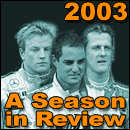 Mr Cool: Interview
Mr Cool: Interviewwith Rubens Barrichello
Atlas F1 GP Correspondent
As the season nears its end, Atlas F1 begins the look back at the highlights and low points of the main players in the 2003 Formula One World Championship. This week, Timothy Collings talks to Rubens Barrichello - the man who managed to outqualify Michael Schumacher five times and yet endure one of his most frustrating years. But the Brazilian remains, despite all, remarkably cool...
Typically, Barrichello was easy-going and honest on the subject. He always has been. Since he burst on the Formula One scene in the shadow of Ayrton Senna, his mentor, a fellow Paulista and excellent example to those who followed him, his has been a career to follow because it has been coloured by incidents and controversies, from Senna's death in 1994 to Schumacher's supremacy in modern times. Barrichello, of all of them, has certainly seen it all and shared time with some great Formula One characters and personalities: Eddie Irvine, Eddie Jordan, Johnny Herbert, Sir Jackie Stewart and Schumacher to name but a few.
And it has never been easy for him. From personality differences with Irvine to political and sporting support for Schumacher at times when, he felt, he had a better car and a chance to win. Just recall the Austrian Grand Prix of 2002 to remember what that was all about. Nowadays, however, Barrichello just shrugs at the memories.
He is not as hot-tempered or passionate as he used to be, a condition that obviously follows years of living in Cambridge, working under Eddie Jordan and Sir Jackie Stewart and then going through that human mincing machine known as the Italian sports media, especially in the way they treat any Ferrari driver who seems to be low on confidence, speed or performance. It was, therefore, encouraging to meet a cool and smiling Barrichello in the Ferrari coffee area in Indianapolis (where the red espresso machine worked overtime, American coffee being a dull, brown water in comparison to what is expected in Italy).
Asked about his current season, however, Barrichello responded with an enigmatic shrug and a smile. "In terms of results, a little disappointing," he said. "But in terms of performance and getting the car right, I think it was better than last year. We were much more competitive and the win [in Silverstone] was fantastic - more fantastic than any win last year." He looked down at a list of notes compiled to prompt him through each round of the championship this year. "Do you really want me to go through all of them?" he asked. Then, he gave his comments. They sounded like a dramatic script. Nothing, it seemed, went to plan. Or only rarely. Mostly, it was high hopes, frustration and disappointment.
"In Australia, The HANS was really hurting me and it took my concentration away. In Malaysia, we didn't have the car to beat McLaren, but we did OK. Brazil was the greatest disappointment... San Marino was up and down. In Spain, we were very surprised by Renault. Monaco was very disappointing because the strategy to begin with was a little bit difficult and I had two laps of traffic before I came into the pits, which really destroyed my race there. Canada, I made a small mistake. At the Nurburgring, I had quite a good race and finished third.
It was too early to ask about Indianapolis, but we can guess how it would have been described. Something like 'A good grid position, but then...' But back to Barrichello, who, surprisingly, has enjoyed his season. "I quite liked the season to be honest. A fighting season is always in the spirit of racing," he explained, adding that he enjoyed the one lap qualifying system.
The results, particularly recently, appear to prove it. "It's down to the good chemistry between me and my engineers and there's just been a click. I like the one-lap qualifying as it's so challenging. At some time during the year it did improve. I went forward in terms of pure speed."
But that was not the whole story, as he knew. He had also overcome some kind of perceived mini-crisis surrounding his form. He acknowledged this. "The good thing about it is that you have to rely on yourself (in these kind of circumstances). The only person who fully understands you is you! So, you just have to remain calm when the situation is like that. Then when you come to the conclusion, you can just tell everyone to shut up. England was so nice for me, because there had been so much talk, then all of a sudden I was there, winning the race, and I've always enjoyed being there."
And the new Mr Cool approach has obviously helped too. Barrichello accepted this suggestion. "Yes, and, you know, everybody says about (Jarno) Trulli for example that he must improve his pace in the race. Some time ago, they would say that 'Rubens does not have the mental toughness to beat Michael in the race', but I proved that I did. It depends on myself really. I used to worry about what people used to say, but to work with an Italian team and the Italian press I had to become another person - or I would have killed myself! And compared to say 1995, I am about two seconds quicker than I used to be. Not in my feet, but in my head."
Next year might be the chance. And, ten years on from Imola, it would be the most appropriate way for one Brazilian to honour the memory of another. It was, after all, Senna's death that hurt Barrichello's early career the most. All those months, and years, of heart-searching and sensitivity were like an open invitation to harder-headed men to take advantage.
He had to re-learn to race to win, to race to succeed and his move to Stewart Grand Prix did that. The final move to Ferrari as Schumacher's teammate supplied the opportunity to complete his apprenticeship as a Champion. No-one has prepared better or been through better schools. And Formula One will have a season to remember if the two men in red are racing each other in earnest in 2004.
It has been a topsy-turvy year for Rubens Barrichello. Inconsistent, unpredictable, punctuated by some wretched ill-fortune and, to make matters worse, scarred also by a period during the middle of the year when it seemed his stock value was falling in the Italian media and, perhaps, at Maranello. But the boy from Brazil, still happy and ambitious after all these years, has kept alive his dreams and maintained his composure. Most of all, he remains one of the nicest people in the pitlane and, certainly, one of the most accessible and friendly of all the drivers at the sharp end of the grid.
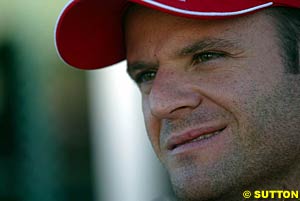 In Indianapolis, of course, he suffered again. Bizarrely, at the hands, or wheels, of his friend and fellow-Latin American Juan Pablo Montoya. It was an incident that not only wrecked Rubens' race, but also, ultimately, ended the Colombian's world title hopes. To the naked eye, it looked like a racing incident, but to the stewards there was blame to be apportioned and it was Montoya, who hardly needed it, who was given a drive-through penalty. Rubens obviously felt it was a harsh decision, but for his Ferrari team and their established number one driver, it was one that did the scarlet scuderia and Michael Schumacher plenty of good.
In Indianapolis, of course, he suffered again. Bizarrely, at the hands, or wheels, of his friend and fellow-Latin American Juan Pablo Montoya. It was an incident that not only wrecked Rubens' race, but also, ultimately, ended the Colombian's world title hopes. To the naked eye, it looked like a racing incident, but to the stewards there was blame to be apportioned and it was Montoya, who hardly needed it, who was given a drive-through penalty. Rubens obviously felt it was a harsh decision, but for his Ferrari team and their established number one driver, it was one that did the scarlet scuderia and Michael Schumacher plenty of good.
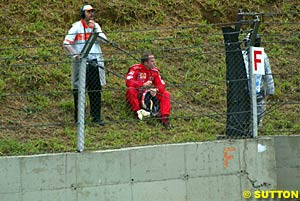 He had qualified on the front row that day. He was happy. He was unsure about his future, but believed it would all work out well. He felt he was still improving and, he said, he had learned to cope with all the pressures. Lest we forget, it should be said here that Barrichello speaks Italian (he had good early experience in Italy early in his career), that he speaks very good English (Cambridge days, of course) and that he can manage in Spanish as easily as his natural tongue, Portuguese. He is affable and easy-going. Yet he seems always to have to prove himself, despite the views put forward last weekend in America by Stewart, who suggested that Barrichello had the pace to win races and accumulate a fine pile of triumphs.
He had qualified on the front row that day. He was happy. He was unsure about his future, but believed it would all work out well. He felt he was still improving and, he said, he had learned to cope with all the pressures. Lest we forget, it should be said here that Barrichello speaks Italian (he had good early experience in Italy early in his career), that he speaks very good English (Cambridge days, of course) and that he can manage in Spanish as easily as his natural tongue, Portuguese. He is affable and easy-going. Yet he seems always to have to prove himself, despite the views put forward last weekend in America by Stewart, who suggested that Barrichello had the pace to win races and accumulate a fine pile of triumphs.
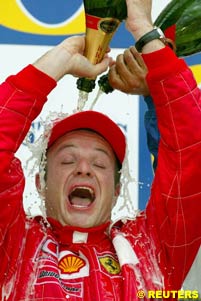 "In France, I lost the car on the first lap, but again I fought back and it was really a good moment of my season because everyone was saying 'Barrichello has lost his pace, the 2003 car is no good for him.' But, I came back and won at Silverstone and it sent out a message: shut up! It was a hell of a race. In Germany and Hungary I could have done really well and got a lot of points - maybe even fighting for the championship, if it wasn't for those two races! In Monza, I had a good first part of the race."
"In France, I lost the car on the first lap, but again I fought back and it was really a good moment of my season because everyone was saying 'Barrichello has lost his pace, the 2003 car is no good for him.' But, I came back and won at Silverstone and it sent out a message: shut up! It was a hell of a race. In Germany and Hungary I could have done really well and got a lot of points - maybe even fighting for the championship, if it wasn't for those two races! In Monza, I had a good first part of the race."
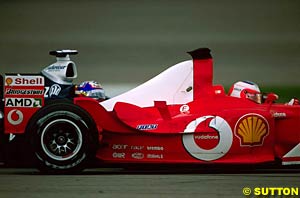 This is the news that all genuine Formula One fans will have been pleased to hear. It signalled that Barrichello intends to stay around and fight for his own chance to win the drivers' title. He nods in agreement. "Yes, I haven't reached my peak. I am sure of that. And I just have to keep it cool. Life is like a circle and there are good times and there are bad times. I just have to be ready when the car is ready for me - and, you know, I'm still fighting to be a World Champion."
This is the news that all genuine Formula One fans will have been pleased to hear. It signalled that Barrichello intends to stay around and fight for his own chance to win the drivers' title. He nods in agreement. "Yes, I haven't reached my peak. I am sure of that. And I just have to keep it cool. Life is like a circle and there are good times and there are bad times. I just have to be ready when the car is ready for me - and, you know, I'm still fighting to be a World Champion."
Please Contact Us for permission to republish this or any other material from Atlas F1.
|
Volume 9, Issue 40
Atlas F1 Exclusive
Interview with Rubens Barrichello
Ann Bradshaw: View from the Paddock
2003 US GP Review
2003 US GP Review
The Michael Schumacher Problem
American Heartbreak
Stats Center
Qualifying Differentials
SuperStats
Charts Center
Columns
Season Strokes
On the Road
Elsewhere in Racing
> Homepage |